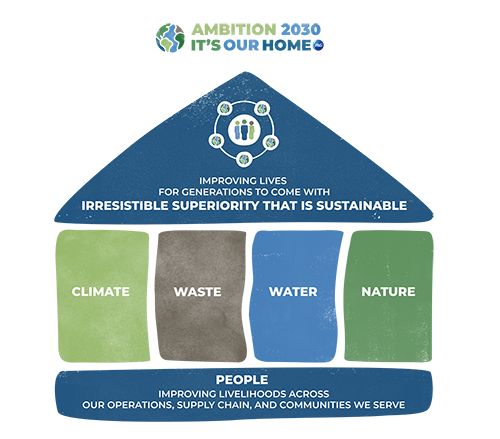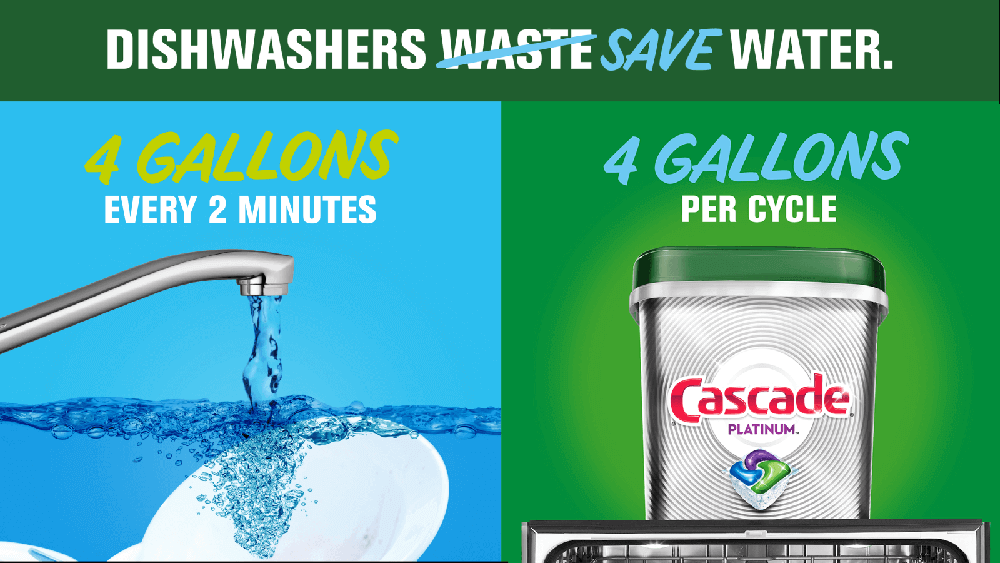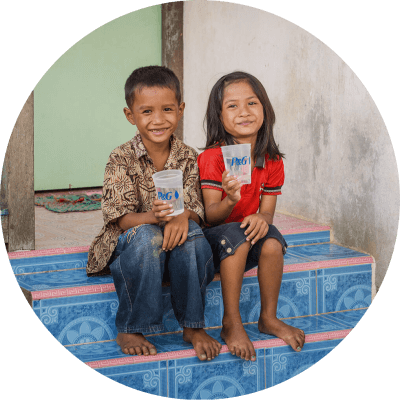12/1/2022
The Sustainability Sweet Spot — Delighting Consumers with No Trade Offs
Guest Authors: Virginie Helias, Chief Sustainability Officer, and Alex Keith, CEO P&G Beauty
Environmental sustainability is becoming critical as expectations from consumers, customers, business partners, governments, shareholders and stakeholders continue to rise. To address this opportunity, we build sustainability into our work rather than bolting it on as a separate activity.
We are setting a new standard of superiority, one where consumers’ sustainability expectations are considered from the start of the innovation journey. This is our opportunity to be best at both innovation that solves everyday problems and improves lives for generations to come, now.

P&G’s Ambition 2030 plan supports our brands’ ability to provide irresistible superiority that is sustainable. It is built on the strength of four pillars — climate, waste, water and nature — where we can make the biggest difference for the planet and our business. At its foundation, it improves the livelihoods of people across our operations, supply chain and the communities we serve. These four key focus areas are now integrated into our superiority strategy:
- Climate: We announced our goal to deliver Net Zero greenhouse gas emissions by 2040. We have established milestone targets for 2030 to pace our efforts. We have already achieved an absolute reduction of 57% in greenhouse gas emissions in our operations globally vs. 2010 when we started our tracking.
- Waste: Our goal is to have 100% of our consumer packaging recyclable or reusable by 2030, and we anticipate reaching nearly 80% this year. We are making progress against our 50% virgin plastic reduction goal.
- Water: We are delivering innovations to enable consumers to use our products with less or no water. Our manufacturing sites have collectively increased water efficiency by 25% and recycled over 3 billion liters.
And we are supporting several water restoration projects that will provide a range of solutions to protect ecosystems, replenish groundwater supplies, reduce the amount of water diverted from essential bodies of water and improve water quality for the communities and wildlife that depend on it. - Nature: We have a range of efforts spanning responsible sourcing and a commitment to advance projects that protect, improve or restore critical ecosystems, and by doing so, impact over one-and-a-half million acres of land and deliver carbon benefits greater than any remaining manufacturing emission we will have this decade.
Here are just a few examples of our commitment to deliver irresistible superiority in an environmentally sustainable way:
- In Fabric Care, up to 60% of the carbon footprint comes from the use phase, that is, from the energy used to heat the water when consumers wash their clothes at home. Washing in cold saves household energy bills up to $150 per year in the U.S. and over half of the energy bill from laundry in Europe. Tide and Ariel are educating consumers on the benefits of cold-water washing through campaigns in North America and Europe. The impact of these efforts is expected to reduce emissions by +30 million tons by 2030. These campaigns have proven to create value for shareowners by growing users and growing usage.

-
Designing our packaging for Reduce, Reuse, and Recycle is essential. Ariel ECOCLIC, which is launching in Europe, is made from 70% recycled fibers and is designed to be recycled, while preventing young children from accessing the pods.
P&G is transforming the industry by leading innovation on packaging & waste and making these technologies available to the entire industry. We invented a patent-protected recycling technology to produce virgin-like resin from polypropylene waste. P&G licensed it to Pure Cycle Technologies and made it available to the rest of the industry. As Pure Cycle announced, they expect to start production by the end of this calendar year. Another example is Holy Grail 2.0. This is a digital watermark technology that can increase both the quantity and quality of recycled materials via intelligent sorting. -
Cascade is using its voice to reduce daily water use in households across the U.S. by encouraging people to skip pre-rinsing dishes and instead run the dishwasher every night. Contrary to popular belief, the dishwasher uses four gallons of water per cycle, while the sink can use that same amount in just two minutes. By skipping the sink with Cascade and choosing the dishwasher, households can save up to 20 gallons per load. Cascade grew organic sales behind this superior innovation and sustainability campaign… increasing auto-dish loads per week by +25%.

- Herbal’s Bio:Renew line includes active botanicals that have a real impact on hair and scalp. Aloe is one of 33 botanicals in Herbal Essences Bio:Renew line. There are more than 300 species of aloe in the world, so as we developed this line, we started with ensuring that what we were sourcing was actually aloe — and that it was of high quality. P&G did this through our partnership with Royal Botanic Gardens, Kew, the world’s leader in botanical science. We selected our supplier based on this and then contracted with the Union for Ethical Bio-trade to audit the supply chain through the lens of our Responsible Sourcing guidelines, which we developed and implemented about a year ago and have posted publicly on our Responsible Beauty page.
We have a responsibility to make the world better, through the products we create and the impact our brands and Company can have in communities worldwide.
Click here to learn more about sustainability at P&G.


